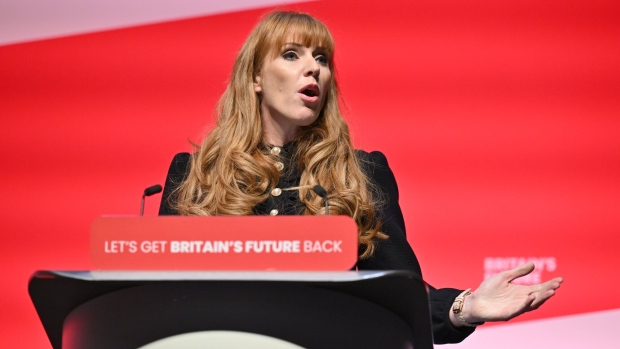Mar 28, 2024
Starmer’s No. 2 Angela Rayner Seeks New Power Base in Future Labour Government
, Bloomberg News

(Bloomberg) -- Keir Starmer’s deputy, Angela Rayner, plans to establish a powerful new department at the core of UK government to shore up her position if the opposition Labour Party wins the next general election.
Rayner is seeking to re-establish an Office of the Deputy Prime Minister, similar to the set-up John Prescott enjoyed during his decade-long tenure as Tony Blair’s deputy from 1997, according to people familiar with the matter. It would have its own staff, giving Rayner a base at the center of government that would include a remit for favored policy areas including homelessness, said the people, who requested anonymity to discuss plans that aren’t yet approved.
Rayner, 44, has close links to the trade unions who are responsible for a sizable portion of Labour’s funding, having previously worked for the Unison union. She’s previously joked that she is “John Prescott in a skirt” due to their similar styles as politicians — working class, blunt-talking and with the propensity for occasional gaffes. Like Prescott, she oversees a sprawling policy brief that, in her case, includes responsibility for housing, local government and communities as well as oversight of workers’ rights.
While that would give her oversight of her own department in government, the inclusion of pet policy areas in a new deputy prime minister’s office would mean she could likely retain a grip on them even if she was shuffled out of her separate departmental role. It would also give her a presence closer to decision-making in Downing Street, with the ability to wield influence in the way Prescott did.
“This could be shadow boxing around the organizational decisions that will be taken by Keir Starmer in the first days of a Labour government, and Rayner is locking in her areas of interest,” said Alex Thomas, program director at the Institute for Government. “And if she is asserting herself through the brand of Deputy Prime Minister, running things out of the Cabinet Office, that gives her a power base and authority at the center of government.”
The proposals — which have been submitted by Rayner as part of Labour’s preparations for its election manifesto — will require approval from Starmer’s office and the manifesto team, but his chief of staff, Sue Gray, is supportive of the idea, according to a person familiar with the matter. Nevertheless, the move could be blocked by others in the leader’s office who may see the idea as a power grab from Rayner, who is suspected by some Starmer allies of harboring leadership ambitions.
Labour said in a statement that the party would run a government that will be “laser-focused” on delivering on its promises. “That strategic long-term thinking to overturn 14 years of Tory failure will require a different way of doing things,” it said, adding that “full plans” will be set out “in due course.”
The jockeying for position and influence shows how Labour’s senior leaders are increasingly preparing for government, with the opposition party enjoying a wide polling margin over the ruling Conservatives ahead of an election that Prime Minister Rishi Sunak must hold in the next 10 months.
Starmer and Rayner have separate mandates from the Labour Party membership, which elected both of them. That means Starmer can’t fire Rayner as deputy party leader, though her cabinet responsibilities and title of deputy prime minister remain within his gift if Labour win the election. He has nevertheless said he intends to make her deputy prime minister.
The leadership duo, elected by party members in 2020, got off to an apparently rocky start, culminating in a failed attempt by Starmer to strip Rayner of responsibilities following a calamitous by-election defeat in Hartlepool in 2021. Then, Rayner asserted her right to a shadow cabinet role as deputy leader, and emerged from a lengthy meeting with Starmer strengthened by an enlarged policy brief. She has since likened their relationship to an “arranged marriage” that has “evolved” over time.
Highlighting the improvement in their relationship since then, the two politicians on Thursday jointly launched Labour’s campaign for the May 2 local elections, putting an emphasis on policy areas that fall under Rayner’s brief, including a promise to devolve more power to local councils and efforts to spread wealth more evenly across the country.
Starmer made clear he doesn’t intend to water down Rayner’s key pledge to boost employment rights by scrapping zero-hour contracts and banning fire and rehire practices, even after some businesses expressed anxieties about the plan. The Labour leader also said Rayner has his “full support” after police said they were reviewing a decision not to investigate whether she correctly paid tax on the sale of her council house.
Rayner’s plan for a formal deputy’s office breaks from the mold of recent Conservative governments. The current deputy prime minister, Oliver Dowden, doesn’t have a specific office or departmental apparatus attached to his role, and nor did his immediate predecessor Dominic Raab. The last deputy to enjoy that was Nick Clegg, the Liberal Democrat leader who served as Conservative Prime Minister David Cameron’s number 2 in the 2010-2015 coalition government.
--With assistance from Ellen Milligan.
©2024 Bloomberg L.P.







